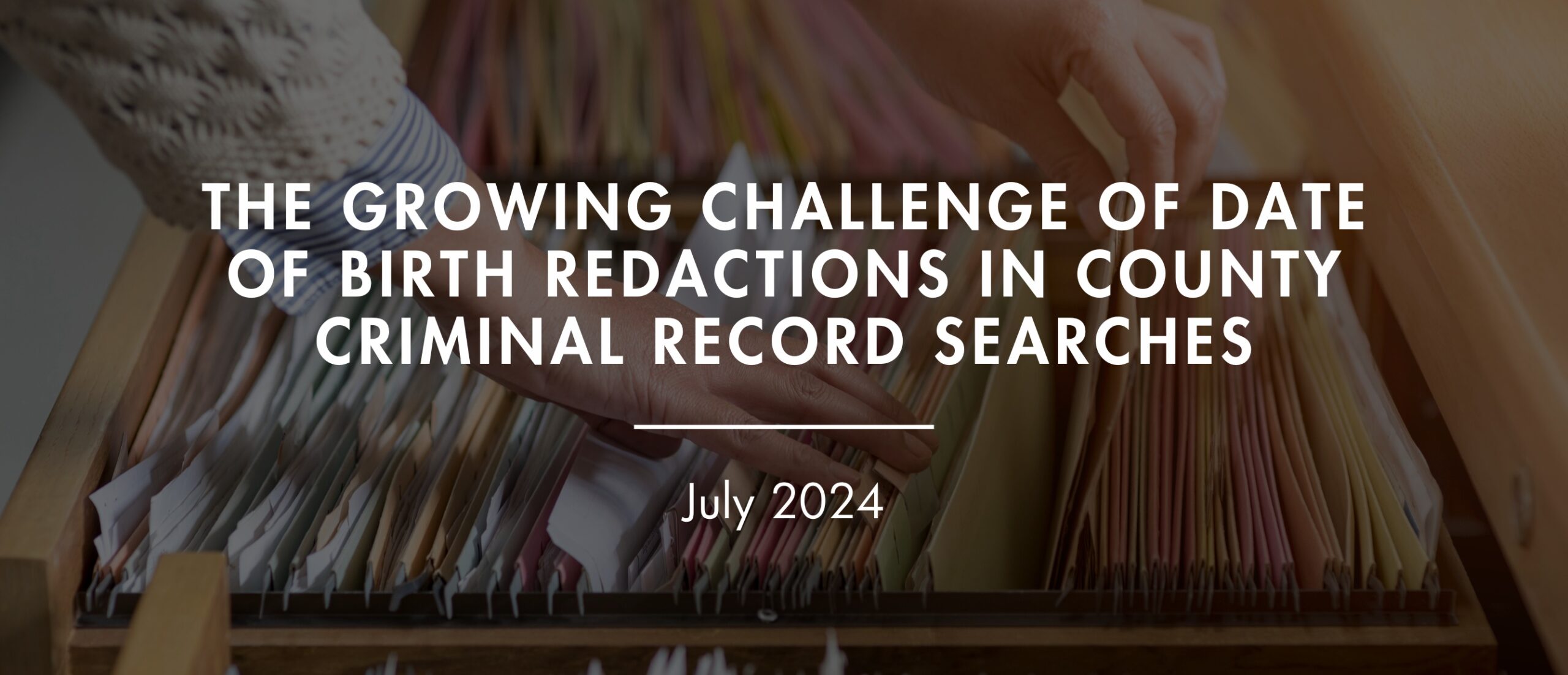In recent years, a significant trend has emerged in the realm of public records access: the redaction of dates of birth (DOB) from county criminal records. This shift, driven by privacy concerns and consumer data protection efforts, has created new challenges for employers, background screening companies, and other organizations and individuals seeking accurate information. While the intent behind these redactions is commendable, the unintended consequences have far-reaching implications for the background check industry and those companies that rely on its services.
Background checks play a vital role in many aspects of our society, from employment decisions, tenant screening, volunteer screening, and for vetting franchisee buyers and country club members. These checks help organizations make informed decisions, protect vulnerable populations, and maintain safe environments. At the heart of this process are consumer reporting agencies (CRAs), which are specialized companies that compile and provide consumer reports, including background checks, in compliance with the Fair Credit Reporting Act (FCRA).
The importance of date of birth information in criminal record searches cannot be overstated. It serves as a crucial identifier, helping to distinguish between individuals with similar or identical names. Without this vital piece of information, the risk of false positives or missed records increases substantially. Imagine trying to determine if a “John Smith” with a criminal record is the same person as your job applicant named John Smith, without knowing their date of birth. The task becomes significantly more complex and prone to errors without a full DOB. This is especially true as most criminal records contain no social security number (SSN).
It’s important to note that CRAs only perform background checks with the explicit consent of the consumer. This consent is a fundamental requirement of the FCRA and serves as a safeguard for individual privacy. Given this requirement, the privacy concerns that drive DOB redactions in public records should not apply to background checks conducted by CRAs. Consumers who agree to a background check are willingly providing their personal information for this specific purpose.
The impact of these redactions is felt most acutely in the employment screening process. Employers rely on comprehensive background checks to make informed hiring decisions, protect their employees and customers, and comply with industry regulations. With DOB information redacted, the ability to accurately match criminal records to specific individuals becomes significantly more challenging. This can lead to delays in the hiring process, increased costs, and potentially, hiring decisions based on incomplete or inaccurate information.
Background screening companies, particularly those that are also consumer reporting agencies, have had to adapt quickly to these changes. CRAs are bound by the Fair Credit Reporting Act, which prohibits them from linking criminal records to individuals based solely on a matching name. Without access to full DOB information at many county public access terminals, these companies must now expend additional resources to deal directly with county clerk officials – and their often delayed response time at providing physical court records – to verify the accuracy of these criminal records searches.
It’s crucial for employers and individuals to understand the importance of working with reliable background screening companies, especially those that are also CRAs. These organizations are not only well-versed in navigating the complexities of DOB redactions but are also bound by strict legal and ethical standards. They must adhere to FCRA guidelines, ensuring that the information they provide is as accurate and up-to-date as possible.
Moreover, CRAs are required to maintain rigorous quality control measures and provide mechanisms for individuals to dispute inaccurate information. This level of accountability is essential in an era where access to complete information is becoming increasingly challenging.
As the landscape of public records access continues to evolve, it’s likely that more jurisdictions will implement similar redaction policies. This ongoing trend underscores the need for a balanced approach that protects individual privacy while still allowing for necessary and legitimate access to criminal record information.
In response to these challenges, some industry associations are advocating for solutions that address both privacy concerns and the need for accurate background checks. These efforts include working with legislators to find compromises that protect personal information while still allowing for effective screening processes.
To address this issue, counties should consider implementing a tiered access system. While it’s reasonable to redact DOBs from public-facing records to protect privacy, CRAs should be granted access to full DOB information. This approach would maintain privacy for the general public while allowing CRAs to conduct accurate and efficient background checks. Such a system could involve a vetting process to ensure that only companies such as CRAs – that already have the consumer consent – are the only authorized entities with access to this sensitive information.
For employers and organizations that rely on background checks, it’s essential to stay informed about these changes and work closely with their screening providers to understand how DOB redactions may impact their hiring processes, as well as their applicant approval process (such as tenant, franchisee and membership). They may need to adjust their expectations regarding turnaround times and be prepared for potential increases in costs associated with more complex search methods.
The redaction of dates of birth from county criminal records represents a significant challenge for the background screening industry and its clients. While privacy protection is a valid and important concern, the unintended consequences of these policies have far-reaching implications. As this trend continues, it will be crucial for all stakeholders – including employers, background screening companies, legislators, and privacy advocates – to work together to find solutions that balance the need for privacy with the equally important need for accurate and comprehensive background checks. By choosing reliable, FCRA-compliant background screening companies and staying informed about these evolving challenges, organizations can navigate this complex landscape and continue to make informed, responsible applicant approval decisions.
Posted by: Rudy Troisi, L.P.I., President and CEO, Reliable Background Screening
Copyright © 2024, Reliable Background Screening, a Division of Marcett, Inc. All rights reserved.


